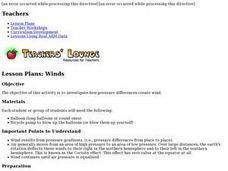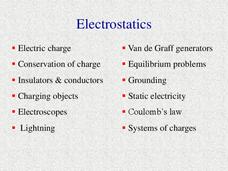Curated OER
Winds
Fifth graders investigate how pressure differences create wind. They discuss the Coriolis effect, then explore what happens when blown-up balloons are released.
NASA
Raisin Bread Universe
What is the universal breakfast? The resource includes two activities, the first one observing oatmeal to understand the texture of the universe. Then, scholars measure raisin bread dough before and after it rises to represent the...
Michigan State University
Gases Matter
Young scientists learn that seeing isn't necessarily believing when it comes to the states of matter. After performing a fun class demonstration that models the difference between solids, liquids, and gases, children complete a series of...
Curated OER
Balloon Staging
Students discover how rockets can reach a higher altitude by using staging. They use balloons to demonstrate this concept and then practice with rockets. They discuss the results to end the lesson.
Curated OER
What In The World Are Swim Bladders and Why Are They Important
In this swim bladders worksheet, students use a bowl, water, and balloons to make swim bladders, and answer short answer questions about them. Students answer 7 questions and interview someone who has been scuba diving.
Curated OER
Static Electricity
In this static electricity worksheet, pupils use balloons, flannel cloths, and a plastic bag to create static electricity. Students then fill out 3 tables and answer 3 short answer questions.
Curated OER
Ice Eggs
Students melt colored ice cubes which are created from a funnel, balloons, water, and food coloring. In this ice lesson plan, students put food coloring into water in a balloon, freeze it, and see how the food coloring ended up making...
Curated OER
The Expanding Universe
In this expanding universe learning exercise, students create a universe with balloons, clothes pins, markers, and more and see what this means for the distance between the Earth and stars. Students follow 6 directions and answer 3...
Curated OER
Weighing air
In this weighing air worksheet, students complete an experiment where they use balloons, string, a balance, a stick, and more in order to weigh air. Students also answer 7 questions.
Virginia Department of Education
Matter and Energy: Equations and Formulas
Using simple materials, an informative instructional activity demonstrates the Law of Conservation of Matter and explains how to balance chemical equations. Young chemists perform experiments, analyze reactions, and balance...
Curated OER
Helium Balloon Race
Students determine the force of a helium balloon that allows it to rise a specific distance. In this helium lesson students calculate the amount of paper needed to construct a weight and determine the density of a piece of...
Curated OER
Latex Helium Balloons: Any Alternatives?
Young scholars discuss the latex balloon release controversy and review suggested alternatives to the latex balloon.
Curated OER
Forces and Balloons
Students investigate the forces of compression, tension and torque on common birthday balloons.
Curated OER
The Magic Of Static Science Station Experiment
In this magic of static electricity set of station activities worksheets, students perform 4 activities with static electricity including popping corn, jumping peanuts, weird water, and dancing balloons. They complete the recording...
Curated OER
Colored H2 Balloon Explosions
Students perform an experiment in which they put different types of salts in a balloon, fill it with hydrogen gas, and ignite it. The electrons in the salt molecules are excited by the heat and release energy in the form of light. ...
Curated OER
Balloon Lungs
Students study the function of lungs. In this lung function lesson, students complete an experiment using balloons to study the way lungs work. Students study a diagram of their lungs and make a hypothesis for their lung capacity...
Curated OER
Balloon Rocket
In this friction investigation worksheet, students follow the directions to construct a balloon rocket. Students use a string lubricated with soap and a drinking straw with a balloon. This is a page from the UK.
Curated OER
Gluten and Balloons What Do They Have In Common?
Students examine the purpose of gluten in bread making and what type of flour is needed to make bread. They compare the properties of a balloon to bread dough to explain yeast fermentation. They make bread.
Curated OER
Science-Unit on Matter-Gases
First graders understand that gases take up space even though you can't see or smell it. This is done through many experiments like trapping air in different sized bags, using balloons and plastic bottles, and blowing bubbles. They...
Curated OER
What is Air?
Learners investigate air by participating in a class experiment. In this matter measurement lesson, students identify air as a gas which consists of mass. Learners utilize a windsock or balloon to measure oxygen and explore it's true...
American Chemical Society
Air, It's Really There
Love is in the air? Wrong — nitrogen, oxygen, and carbon dioxide are in the air. The final lesson in the series of five covers the impact of temperature on gases. Scholars view a demonstration of gas as a type of matter before performing...
Science Geek
VSEPR and Molecular Geometry
Many chemistry jokes have no reaction. Presentation begins by explaining what models are and the limitations of various forms before introducing the VSEPR model. Then it outlines the rules for creating a VSEPR model and shows examples of...
Urbana School District
Electrostatics
Why did lightning shock the man? Because it didn't know how to conduct itself. Presentation covers electric charges, insulators, conductors, electroscopes, lightning, generators, grounding, static electricity, and more. Presentation...
Santa Monica College
Lewis Structures and Molecular Shapes
Learners practice drawing Lewis dot structures, build molecules with model kits, and predict molecular shapes using VSEPR theory. The combination of written work and hands-on reinforcement benefits young scientists.























